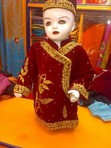Dog Years by Gunter Grass : It makes one bleed with the pathos of the writer.
What a dogged reading. Looks if nothing is going to happen. None of the character talks with himself to bring out any kind of insight. There is a parasitic dependence on the things without to have any movement in the story. It at times is a dog thinking and reasoning like a man and the other way for a man. What is the point of it is as uncertain and as non starter as it appears, if not a sudden quirk or a twist in the story which makes it worth to continue?
Before you reach the middle of the book Gunter Grass begins to overwhelm a reader with the brilliant way he uncovers the distress and consequences of the war under Hitler in the country. An elderly school teacher, a neighbor of the narrator, who taught literature and writing to his students besides other subjects, disappears for his crime of failing to celebrate the birthday of Hitler. He was charged with eating the candies the school administration has allocated for his students.
The cousin of the narrator, Tulla, who he fingers at times beside the daughter of the disappeared school teacher Jenny, to check the depth of their holes, speculate that the teacher has been taken to a place from where a heap of freshly collected human bones have been dumped in open in their town, which foul the air of it all the time and attract a large number of rats and crows.
Sex scenes, more often than not, by Gunter Grass, are not the tenderest and delicate type. They are vicious, crude and occur like an act of sabotage. Taking a reader by complete surprise besides the characters performing it. Similar can be said about the writing style. It makes things obscure in the way they are described in a convoluted language which often is difficult to get hold of. By keeping the going on a scene surprises by its sudden arrival, for it is shocking not only for what it is but also for the lucid and forth-coming language in which it is described.
One hopes the original German language edition reads better than its translation. Also that, a better translated version comes soon in English, which also cares about readability as well. For the subject is the most deadly war one has known; written by someone who fought it as well. Little other literature is available on this subject otherwise–from the side which lost it.
Tulla takes Harry and Jenny to a leech infested area and makes them attach leeches to their bodies and feed them till they are fully fed on their blood and become easily detachable. Then she collects those leeches and cooks them in a tin pot till it becomes a thick paste and eats it and asks them to eat it as well. Tulla think this is how his brother, somewhere fighting in France, might survive the war. But he was killed soon. In their early teens, these three characters try strange things to deal with the effect war has created in their lives.
When the school teacher’s daughter is taken away by a middle-aged dance master and a probable Nazi official, who wants to keep her as a mistress while she learns dance in Berlin, she comes to knock at the door of the narrator’s family to say her goodbye, but the narrator and his parents do not open the door.
Poignant and heart-breaking scene is when Harry, now inducted finally into the army at the age of sixteen comes to say goodbye to Tulla, who is pregnant now at the same age by a person she never discloses, working as a bus conductor to support herself. She wanted Harry to make her pregnant but he always declined this possibility. She offers her bundles of ticket as a souvenir with which he plays with his fingers like a child. It makes Tulla laugh. How the war was sucking in and destroying the lives of young children fills one with a profound sadness. A while ago a bomb drops at a place Jenny was performing and both her toes were amputated to end her dancing career. But the war was to last another three years. Tulla asks Harry to pay the bus fare for the distance he traveled with his modest luggage.
The third part of the novel deals with post war years in the country. Grass deals with so many trends in a desultory manner in the beginning. He picks technology, economy, politics and much randomly in an arcane language, without making any point clearly.
But soon he picks the people trying to practice a conscious amnesia in mass to forget the bad memories of the war. But then a glass comes to the market for children of ten years of age, which makes them see the past of their parents clearly. They see all the murders which their parents have committed but never discussed. It leads to an epidemic of psychiatric diseases in the children using those glasses and many of them commit suicide.
But, some how, behind the religion, liberalism and progress the society tries to hide from its past. The author sarcastically deals with the hypocrisy of the society to collective forget a criminal past. It shows how neatly and effectively the author is capable of dealing with the things he really feels are important before he goes absent minded again and talks about so many generalities in a language which is difficult to decipher.
In a way he expiates alone for the scores of unacknowledged sins committed by the society he belongs to. There are not many writers courageous enough to take up such a thankless task, though many other countries have perpetrated no less horrendous crimes on man kind than the Nazi violence.
It makes one bleed with the pathos of the writer.



